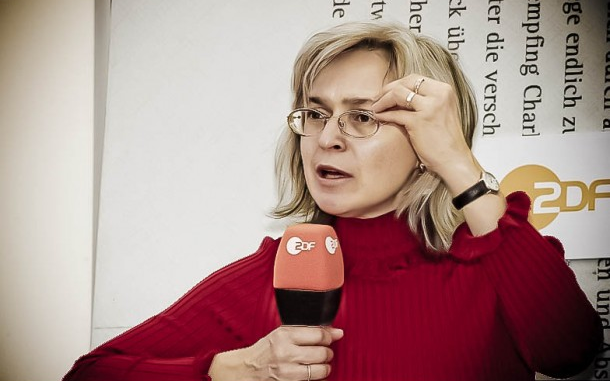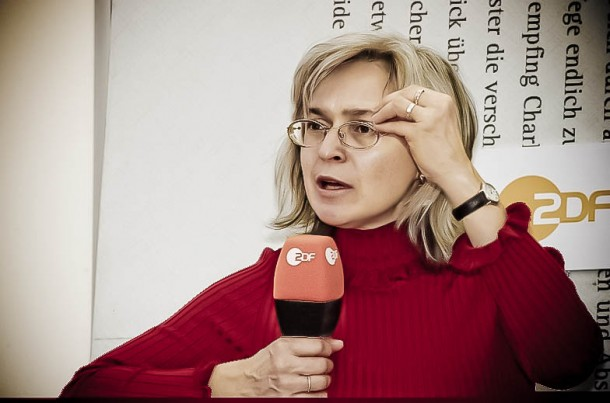
By Alex Crawford
Sky News Special Correspondent and 2019 Anna Politkovskaya Award winner

Fifteen years after the murder of Anna Politkovskaya, it seems women everywhere are under attack and under fire. Women journalists, women activists, women teachers, doctors, politicians. Anna was killed – not just for being a journalist but being a very challenging female journalist. She refused to bow down before injustice and fought like a tigress for those who were helpless to do it themselves. I’m quite sure RAW in WAR and her family and fellow journalists who set up this award in memory of her courage – (and as an inspiration to others like myself to try to emulate her work ) might well have thought, even hoped, that life for female journalists and human rights defenders might just have progressed a wee bit by now. How terribly and depressingly wrong they were.
The events in Afghanistan over the past few months have illustrated how life can turn on a coin – especially if you are a woman. It takes a special kind of courage to stand up and be heard when all around you are armed men bent on repression. Anna had that in bucket-loads – and so does Fawzia Koofi. Fawzia has not only survived in one of the country’s considered the most dangerous in the world to be a woman or a politician, she has risen to the very top despite being both. She is most certainly a woman’s woman in the very male-dominated world that is Afghanistan. Her own education was cut short by the Taliban regime when they first rose to power in the 1990’s. She has spent the rest of her life trying to make sure other women don’t face the same challenges. Becoming one of the most powerful – and therefore most at risk – female politicians in Afghanistan. She was one of the only women on the delegation attempting to negotiate peace with the Taliban and was the first female deputy speaker in the National Assembly. She is, quite simply a woman of extraordinary bravery who has survived two assassination attempts (one during the ongoing peace talks) and has proved to be an inspiration to both women and men inside and outside her homeland. She stayed in Kabul after the capital fell to the Taliban in August despite her house being surrounded by fighters and finally left on one of the last evacuation flights out of the country. She’s now continuously travelling trying to ensure the international community doesn’t forget those women left behind in the country. What a worthy recipient of the Anna Politkovskaya award she is. I can imagine these two strong, fierce women being the best of friends and the closest of conspirators in another time and another era. They really are stunning examples of humankind.
At a time when it seems so depressingly dismal for women and girls in Afghanistan, it seems apt that on the fifteenth anniversary of her murder, Fawzia is the 2021st Anna – the present beacon of hope – an able, articulate defender of the vulnerable and the persecuted. And luckily for the people of Afghanistan, she is not alone either. In a country where there seems no limit to the difficulties facing women, where they’ve seen their basic human rights stripped away overnight, it has spawned some of the most astonishing individuals working against what many would view as virtually insurmountable odds. But a young women in her mid-Twenties wasn’t going to let simple insurmountable odds put her off….instead Zahra Joya set up Rukhshana Media last year – building a network of young, like-minded Afghan women journalists to do what must surely be one of the most dangerous jobs in what’s become a terrifyingly dangerous country if you’re a woman. And their jobs feature some of the most taboo subjects – rape, domestic abuse, forced marriages – all guaranteed to make you Enemy Number One as far as the Taliban are concerned….and it has done. Yet they continue, despite the floggings, beatings, intimidation by men brutally asserting their power through guns and brute force. Truly you have never seen bravery until you have seen a young Afghan woman stand firm, refusing to move, determined to have her voice heard, determined to demand equal rights whilst staring down the barrel of a gun held by a Talib.
And it’s been journalists – female ones – who’ve been at the forefront of this roar to be heard. I, like so many journalists covering the events in Afghanistan recently, have been struck and to be honest, in large part inspired but also traumatised by the courage and the tragedy facing these young courageous female journalists. I’ve had messages and phone calls through the night from desperate young women pleading for the world to listen as the Taliban come knocking on their doors demanding revenge for ‘speaking out’. Overnight, despite the promises to the contrary, females became invisible in the Taliban’s new Afghanistan. I noticed it the minute I crossed the Pakistan-Afghanistan border at Torkham. My male colleagues were greeted and slapped on the back by the Taliban guards. I was ignored. Not even looked at. I was the only one to give a traditional Islamic peace greeting but it fell on stony ground. I had entered a world where to shield my hair, to hide my face, to cover my entire body and to be submissive and silent was not enough. Women have to actually disappear. They were told to leave their workplaces and go home the day after the capital fell to the Taliban. Their jobs evaporated. Their careers folded. Their education disintegrated.
One young twenty-year-old told me she had one day left to finish her thesis. She was to complete her degree on the day of the suicide bombing at the airport. Just one day which changed her entire life and rendered her previous three years work redundant. These young activists engaged in empowering fellow young women for the past few years and with a mother and aunt who are teachers, had travelled the world and had pictures posing with the former First Lady Laura Bush herself. Yet when they needed their foreign friends, they too evaporated. They spoke of how the Taliban were entering their home severy day, demanding to be fed and looked after, asking more and more curious, searching questions about who they’d worked for, where they’d worked and what they’d done. Anyone who worked with the foreign ‘invaders’ is now viewed as a spy, a traitor and a collaborator by the Taliban and faces often instant revenge ‘justice’. It is a terrifying world where the man wielding the gun outside your door and at the end of your street, who is holding all the power right now is also the man who’s come down from years of fighting in the mountains and in the fields, who can’t even read the ID cards he’s checking and who most certainly is not impressed with a commendation letter from the US State Department for services to the Coalition campaign.
That’s why people like Fawzia and Zahra need to be applauded and recognised because they are stunning examples of just what is possible and also representative of so many more women in Afghanistan right now, living in fear but refusing to be silenced.
Remember too please, what’s happening in Myanmar. Afghanistan may have grabbed the world’s attention for a while but those being persecuted and hounded in Myanmar continue to be subjugated. It’s ferociously difficult to get inside Myanmar as an independent voice and fantastically dangerous to report or even get the information to the outside world. This means in this black vacuum, the world is blind to the atrocities going on there. Eight thousand human rights defendants and that includes activists, media workers, medical workers, artists, political opponents and critics of the regime have been arrested…..and arrested in Myanmar can mean torture, rape, sexual assault, death. Many of them are women. We may never know their names but we cannot forget them. They’re suffering now, dying now, being tortured now. RAW wants to remember them – remind the world of the silent sacrifices being made by women in Myanmar who are screaming against injustice there right now, demanding to be heard.
Fawzia, Zahra and the women of Myanmar are determined to make sure the international community does not forget their sisters, daughters, mothers, trapped in this hell. It is a hell which, as far as Afghanistan’s concerned, has been largely created by the outside world through a string of mismanaged and catastrophic decisions.
